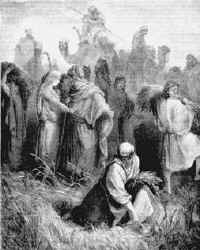The Gospels: Matthew 20 – Parable of Workers in the Vineyard
A parable of unfairness
In Matthew 20 is the parable of the workers in the vineyard. Some men worked all day long in the heat of the day. Some worked only half a day, and some worked only one hour, but they all got paid the same amount, a day’s wage. Some got exactly what they agreed to, but others got more. However, the men who worked all day long said, “That’s not fair. We worked all day long, and it’s not fair to pay us the same as those who worked less” (see verse 12).
But the men who worked all day got exactly what they had agreed to before they began work (verse 4). The only reason they got upset was because other people got more than they deserved.
What did the paymaster say? He said: “Don’t I have the right to do what I want with my own money? Or are you envious because I am generous?” (verse 15).
The boss said he would give them a fair day’s wage for a fair day’s work, and that’s what he did—and yet the workers complained. Why? Because they compared themselves with others and they got the shorter end of the stick. They got their hopes up, and then they were disappointed.
 |
| Those who worked all day were angry for getting the same wages as those who worked less hours. |
But the landowner said: “I am doing you no wrong. If you think it’s not fair, the problem is in what you expected, not in what you actually got. If it hadn’t been for the amount I paid the newcomers, you would be quite happy with what I gave you. The problem is in your expectations, not in what I did. You accuse me of being bad, simply because I was good to someone else (see verse 15).
How would you react to this? What would you think if your boss gave a bonus to the newest employees, but not to the old faithful workers? It would not be very good for morale, would it? But Jesus was not giving us payroll advice here—he was telling a parable about the kingdom of God (verse 1).
The parable reflected something that was happening in Jesus’ ministry. God was giving salvation to people who hadn’t worked very hard, and the religious leaders said: “That’s not fair. You can’t be generous to them. We’ve been working hard, and they have hardly been working.” And Jesus replied, “I am bringing good news to sinners, not to the righteous.” His teaching threatened to undermine the normal motive for doing good.
Where do we fit in?
We might like to think that we have worked all day long, bearing the burdens and the heat of the day, deserving a good reward. But we have not. It doesn’t matter how long you’ve been in the church or how many sacrifices you have made; those are nothing in comparison to what God is giving us. Paul worked harder than any of us; he made more sacrifices for the gospel than we realize, but he counted it all as a loss for Christ. It was nothing.
The time we’ve spent in the church is nothing to God. The work we’ve done is nothing compared to what he can do. Even at our best, as another parable says, we are unprofitable servants (Luke 17:10). Jesus has bought our entire lives; he has fair claim on every thought and every action. We cannot possibly give him anything on top of that—even if we do everything he commands.
We are really like the workers who worked only one hour and got a whole day’s wage. We just barely got started, and we were paid like we actually did something useful. Is that fair? Maybe we shouldn’t even ask the question. If the judgment is in our favor, we shouldn’t ask for another evaluation!
Do we think of ourselves as people who have worked long and hard? Do we think we deserve more than we are getting? Or do we see ourselves as people who are getting an undeserved gift, regardless of how long we’ve worked?
Author: Joseph Tkach
